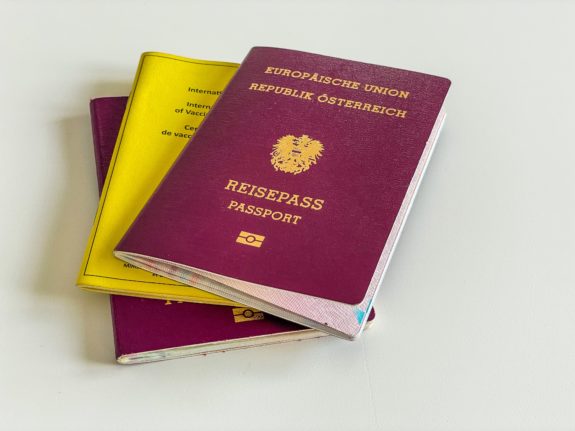Although you don’t legally need to apply for Austrian ID or a passport once you become a citizen, if you’re going to go through the trouble of the country’s restrictive and tough citizenship process – especially by having to give up your previous passport in most cases, there’s plenty of good reasons to apply.
Here’s what to keep in mind once your Austrian citizenship application is successful.
EXPLAINED: When is dual citizenship allowed in Austria?
Your citizenship certificate
The first and most important document you’ll get proving your Austrian citizenship is your Staatsbürgerschaftsnachweis – or citizenship certificate. You’ll need this to apply for your Austrian ID card – or Personalausweis, as well as your Reisepass – or passport.
This document should come to you at the end of your citizenship application. If you lose it or need it again, you can apply for a new one at your local authority or responsible Austrian mission abroad for a cost €14.30 or €8.60 if you have ID Austria. Your state may collect an additional fee on top of this though.
When your citizenship application is successful, your local authority should automatically register your Austrian nationality – meaning you should be registered to vote right away in Austrian federal and state elections and be able to use the full offering of ID Austria – the country’s digital ID. If you’re not sure whether your local authority registered you properly though, you can always book a registration – or Anmeldung – appointment and bring your citizenship certificate with you.
Obviously at this point, you no longer need a residence permit. So if you have any appointments at immigration offices coming up, you can go ahead and cancel them.
READ ALSO: Five surprising Austrian citizenship rules you should know about
Why it’s a good idea to get an Austrian passport
Austria’s European Union (EU) membership and diplomatic engagement worldwide means the Alpine republic boasts one of the world’s most powerful passports.
Obviously, you can travel to and even move to and work in other EU countries using your Austrian passport – and never give up your ability to come back to Austria.

Austrian passport holders also enjoy visa-free travel to 148 countries worldwide and can obtain a visa on arrival in another 30. Twelve countries – including the US, Canada, Australia, and New Zealand – ask Austrian passport holders to fill out an electronic travel authorisation (eTA) online just a few days before travelling. Another 20 countries allow Austrians to apply online for a visa. Just 19 require you to head to a mission abroad beforehand to apply for a visa.
An Austrian passport – or ID card – will also highlight to border control that you are exempt from any restrictions or requirements when setting foot back on Austrian soil. It also gives you extra proof of your Austrian nationality beyond your citizenship certificate.
If you run into trouble abroad, you can also obviously access Austrian consular assistance. You can find a full database of Austrian missions abroad here.
Applying for an Austrian passport typically costs €75.90 for a standard option – although certain express options can be €100 or even €220 for a one-day rush delivery.
EXPLAINED: Who is eligible for a shorter wait for Austrian citizenship?
Your Austrian ID Card
This one is perhaps a good first step even before applying for your passport, as it’s a way to prove your identity and nationality within Austria and the EU, including for things like getting the government’s digital ID. If you start a new job, you may be asked for evidence of your right to work in Austria. Since only Austrian citizens can have an Austrian Personalausweis, showing your card automatically puts this question to rest for you and your respective employer.
Your Austrian passport would do all the same things, plus allow you to travel outside the EU’s Schengen zone. However, your Personalausweis has the obvious benefit of being able to easily fit into your wallet.
Getting one will cost you €61.50.
INTERVIEW: By becoming Austrian, I’ve reclaimed my family’s terrible story



 Please whitelist us to continue reading.
Please whitelist us to continue reading.
Member comments